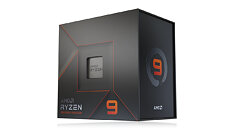- Joined
- Oct 9, 2007
- Messages
- 47,233 (7.55/day)
- Location
- Hyderabad, India
| System Name | RBMK-1000 |
|---|---|
| Processor | AMD Ryzen 7 5700G |
| Motherboard | ASUS ROG Strix B450-E Gaming |
| Cooling | DeepCool Gammax L240 V2 |
| Memory | 2x 8GB G.Skill Sniper X |
| Video Card(s) | Palit GeForce RTX 2080 SUPER GameRock |
| Storage | Western Digital Black NVMe 512GB |
| Display(s) | BenQ 1440p 60 Hz 27-inch |
| Case | Corsair Carbide 100R |
| Audio Device(s) | ASUS SupremeFX S1220A |
| Power Supply | Cooler Master MWE Gold 650W |
| Mouse | ASUS ROG Strix Impact |
| Keyboard | Gamdias Hermes E2 |
| Software | Windows 11 Pro |
AMD on Monday issued a statement refuting reports of performance deltas noticed for its Ryzen 7000-series "Zen 4" desktop processors observed between Windows 11 and Windows 10 operating systems when gaming. The company said that while it is investigating the reports, it has not been able to reproduce these performance deltas, and maintains that Ryzen 7000 series should perform consistently between both operating systems. Architecturally, "Zen 4" isn't different from "Zen 3" with the exception of its AVX-512 ISA that even Windows 10 supports. Windows 10 has awareness for "Zen 4" multi-core topology since it isn't any different from Ryzen 5000 "Vermeer." AMD stated that it continues to work with game developers to ensure their titles are optimized for Ryzen processors.

The statement from AMD on the matter follows.
View at TechPowerUp Main Site | Source

The statement from AMD on the matter follows.
We have been made aware of reports of unexpected performance deltas in certain games with AMD Ryzen desktop processors as well as performance variances between Windows 11 and Windows 10 in certain game titles. We are currently investigating but based on testing to date have not observed a material difference in game performance between OS versions across a variety of operating scenarios and game titles.
Many factors affect gaming performance, including the game engine, CPU architecture, GPU selection and memory choices. As new architectures enter the market, we often observe performance anomalies which must be addressed by the component vendor or the game publisher. This is not a new phenomenon nor is it unexpected.
As we have done since the introduction of Ryzen, when these performance anomalies are brought to light we will use them to steer our partner engagements with game developers and ecosystem hardware partners to implement optimizations that eliminate the variations.
View at TechPowerUp Main Site | Source





 No wonder there is no performance consistency when Microsoft breaks with each update something new.
No wonder there is no performance consistency when Microsoft breaks with each update something new.
